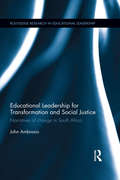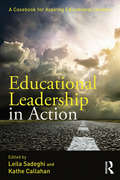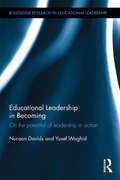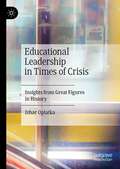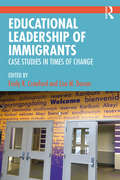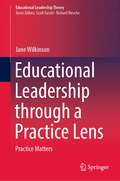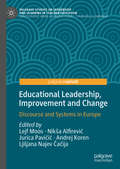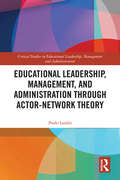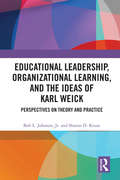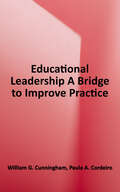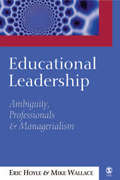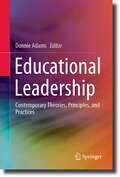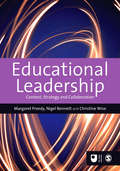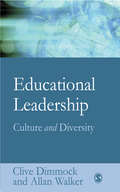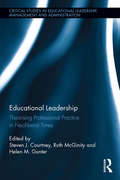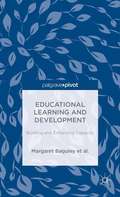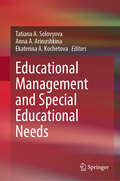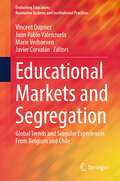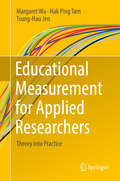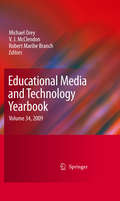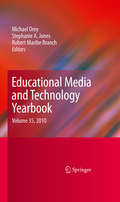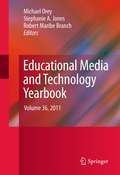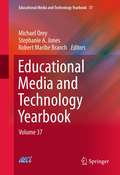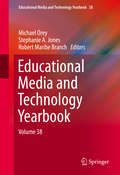- Table View
- List View
Educational Leadership for Transformation and Social Justice: Narratives of change in South Africa (Routledge Research in Educational Leadership)
by John AmbrosioEducational Leadership for Transformation and Social Justice examines the relationship between the lived experiences of educational leaders at the University of the Free State in South Africa and how they think about and practice leadership for transformation and social justice. Based on biographical information, public speeches, published writings, and in-depth semi-structured face-to-face interviews, the book presents and analyses seven chapter-length narratives of these leaders. This book explores how some leaders at the University of the Free State – from the vantage point of various racialized and gendered identities, and generational experiences – conceptualize and enact leadership for transformation and social justice. Ambrosio argues that there are certain values, beliefs, concepts, principles, and ways of thinking that cut across their experiences and demographic differences. The narratives are presented in the leaders’ own words, and describe how their lived experiences shaped their values and identities, and inform how they think about and practice leadership for transformation and social justice. One convergence that emerged among these leaders is that their leadership is an extension of who they are, of their core values, identities and ethical commitments. Another is that they are motivated by visions of change that go beyond the University; by bigger dreams that infuse their work with meaning and purpose. With its in-depth analysis of the narratives, this book will provide educational leaders who have an orientation towards transformation and social justice with insights that enable them to think differently about how to make the policies, programs, and institutional culture of their own universities more equitable and just. It will appeal to academics, researchers and postgraduate students in the fields of education, educational justice, higher education, educational leadership and change, social justice and racial justice.
Educational Leadership in Action: A Casebook for Aspiring Educational Leaders
by Leila Sadeghi and Kathe CallahanEducational Leadership in Action provides 24 complex, real-life, accessible cases to provoke and stimulate conversation around practical problems that confront educational leaders today. Written by a diverse group of educators, these cases cover a wide range of topics, including: teacher evaluations, educational reforms, contract negotiations, school safety, cultural differences, undocumented students, and social media. To foster additional meaningful discussion and debate, this resource includes responses to each of the cases, written by a range of experts. The organization and unique approach of Educational Leadership in Action allows for flexible use in courses for aspiring leaders to supplement core readings, reinforce central concepts, exemplify theory, and provide grounded examples to encourage learning. This essential compendium of cases and responses prepares future leaders to frame problems, identify solutions, and develop strategies to meet the multiple challenges and competing demands in rapidly changing education contexts.
Educational Leadership in Becoming: On the potential of leadership in action (Routledge Research in Educational Leadership)
by Nuraan Davids Yusef WaghidEducational Leadership in Becoming reconsiders educational leadership in its current forms, and presents a more plausible form of educational leadership to contend with the complexities currently found in universities and schools. Much of the literature in vogue concerning educational leadership ranges from transactional to transformative representations of the concept in relation to educational management and policy, curriculum inquiry and pedagogical action. The primary aim of this book is to revisit some of the dominant understandings of educational leadership and to offer an extended view of the practice along the lines of potentiality and becoming. Davids and Waghid argue that all current forms of educational leadership are insufficient to enact responsible human action, particularly when it comes to addressing the combined issues of globalisation and equitable redress and transformation, whether in relation to leading schools or universities. The primary objective of the book is to draw on the Agambian notion of becoming in order to show that an educational leadership in becoming is better placed to not only address the myriad challenges besetting education, but to also enhance the potential of leadership in action. The book addresses an international audience by analysing conceptions of transformative leadership and should be read by anyone who is interested in education and educational leadership, as well as the impact of neoliberal agendas on education and society. It should also appeal to those interested in the philosophy of education.
Educational Leadership in Policy: Challenges And Implementation Within Europe
by Nikša Alfirević Jurica Pavičić Ágúst Hjörtur Ingþórsson Dijana VicanThis book analyzes the challenges of developing and implementing effective policies for educational leadership in South-East Europe (SEE) and the Nordic-Baltic region. While individual countries from the Nordic-Baltic region are praised for their educational achievements, the SEE region could be considered as a (post)transitional landscape: these two educational contexts present their own unique challenges, notably international benchmarking and the ‘Europeization’ of educational policy. Seamlessly integrating theoretical framework with the goals and experiences of actors and practitioners, the editors and contributors build an accessible overview of existing policy research and its conflicting theoretical perspectives. Often disregarded by the mainstream literature, the countries and regions chosen provide a snapshot into the challenges of developing policies for educational leadership. This thoughtful yet practical volume will be of interest and value not only to students and scholars of educational leadership in these regions, but to practitioners and policy makers more widely.
Educational Leadership in Times of Crisis: Insights from Great Figures in History
by Izhar OplatkaThis book aims to fill the gap in our knowledge about crisis management in schools, its particular characteristics, and strategies from a historical point of view. It combines knowledge about educational leadership with biographical narratives of great leaders in history who have faced a tremendous crisis successfully and from whom we can learn a lot about effective coping strategies in times of crisis. The leaders in the book represent different nations and organizations, facing political, military, economic or social crises. The book provides a deeper knowledge necessary for preparing for a possible crisis and for managing it in successful ways if it comes and adds novel insights into the field of educational administration and leadership in the twenty-first century.
Educational Leadership of Immigrants: Case Studies in Times of Change
by Emily R. Crawford Lisa M. DornerThis book prepares current and future educational leaders to adapt to the changing terrain of U.S. demographics, education, and immigration policy. Educational Leadership of Immigrants highlights the educational practices and discourses around immigration that intersect with policies and laws, in order to support K-12 students’ educational access and families’ participation in schooling. Drawing primarily on research from the fields of educational leadership and educational policy, this book employs a case study approach to address immigration in public schools and communities; school leaders’ responses to ethical dilemmas; the impact of immigration policy on undocumented students; and the varying cultural, sociopolitical, legal and economic contexts affecting students’ educational circumstances. Special features include: • case narratives drawn from real-life experiences to support the educational needs of immigrant students; • teaching activities and reflective discussion questions pertaining to each case study to crystallize leaders’ knowledge and facilitate their comfort levels in practice; • discussions of current challenges in education facing immigrant students, their families, educators, and school leaders, especially with changing immigration law.
Educational Leadership through a Practice Lens: Practice Matters (Educational Leadership Theory)
by Jane WilkinsonThis book provides the theoretical and analytical resources for an urgent rethinking of the social project of educating and educational leading. It examines what educational leadership is, namely the politics and power of leadership as a practice, and what it can and should be, offering a pedagogical and praxis-informed approach to educational practice. Drawing on research conducted at various Australian schools and education districts, it argues for a reframing of educational leadership as pedagogical practice/praxis to transform theorising and practice in the field. The book provides a rich account of educational leading through a practice lens, bringing into dialogue the theory of practice architectures with site ontologies, Bourdieu’s thinking tools and feminist critical scholarship.The book tracks the practices and praxis of educational leaders as they grapple with the changing landscape and forces of educational policies that have informed Australian education. It reimagines education leadership by integrating Continental and Northern European understandings of pedagogy and praxis as being morally and ethically informed, as opposed to the narrower Anglophone notions of pedagogy as teaching and learning. The book adds to the body of knowledge on the “actual work of leadership” as a “distinct set of practices” that is morally and ethically informed. Readers will find a more holistic understanding of educational leadership practice and praxis, based on the everyday accounts of educational leaders, teachers and students in schools and education districts.
Educational Leadership, Improvement and Change: Discourse and Systems in Europe (Palgrave Studies on Leadership and Learning in Teacher Education)
by Nikša Alfirević Jurica Pavičić Lejf Moos Andrej Koren Ljiljana Najev ČačijaThis book analyses selected critical concepts of policy and practice in educational leadership in five European countries. The editors and contributors cover Croatia, Slovenia, Lithuania, Denmark and Norway, spanning a wide geographical region as well as diverse historical and political contexts. The analyses primarily consider the issues of convergence and divergence in local educational leadership policies and practice that are developing and emerging from traditional structures and discourses under global, trans-national and regional influences. Focusing on both the macro and micro levels, this book examines a range of topics including international benchmarking, inclusive education practices and digital transformation. It will be of interest and value to scholars of educational leadership in Europe, particularly within smaller countries.“Today’s local educational leadership policies and practice are connected with the historical roots of five small European countries. In the analysis, perspectives from within each country and comparisons are used interestingly. Both levels of analysis bring out new understandings of the relationship between policy and practice and how they have been related to leadership in a historical discourse. In my opinion the different country chapters and the comparisons represent important new knowledge and I recommended the book as reading for school leaders and policy makers in the field of educational leadership.” —Professor Olof Johansson, Umeå University, Sweden “The book fills a gap in the research of cross-national research, comparing school leadership issues in two Balkan countries, Croatia and Slovenia, one Baltic country, Lithuania, and two Scandinavian countries, Norway and Denmark. To my knowledge it is the first time there has been this sort of cross-investigation of commonalities and differences in school leadership conditions between these countries in the age of globalization. I am sure that many scholars and practitioners can benefit from this book and hereby recommend it. “ —Associate Professor Emeritus Klaus Kasper Kofod, Aarhus University, Denmark
Educational Leadership, Management, and Administration through Actor-Network Theory (Critical Studies in Educational Leadership, Management and Administration)
by Paolo LandriEducational Leadership, Management, and Administration through Actor-Network Theory presents how actor-network theory (ANT) and the related vocabularies have much to offer to a critical re-imagination of the dynamics of management in education and educational leadership. It extends the growing contemporary perspective of ANT into the study of educational administration and management. This book draws on case studies focusing on new configurations of educational management and leadership. It presents new developments of ANT ("After ANT" and "Near ANT") and clarifies how these "sensibilities" can contribute to thinking critically and intervening in the current dynamics of education. The book proposes that ANT can offer an ecological understanding of educational leadership which is helpful in abandoning the narrow humanistic world of managerialism, considering a post-anthropocentric scenario where it is necessary to compose together new "liveable" assemblages of humans and nonhumans. This book will be of great interest to academics, scholars and post-graduate students in the fields of educational management, leadership and administration, as well as education policy. It will also be highly relevant to policy makers and experts of education policy at the national, European and international levels.
Educational Leadership, Organizational Learning, and the Ideas of Karl Weick: Perspectives on Theory and Practice
by Sharon D. Kruse Bob L. Johnson Jr.Grounded in the theory of sociologist Karl Weick, this edited volume explores key concepts of educational leadership and organizational learning. Chapter authors analyze and reflect on the implications of Weick’s thinking on leadership preparation and development. Providing a thorough understanding of the influence of his ideas in education, this volume unpacks the ways in which Weick’s ideas influence and shape organizational learning and educational leadership and policy today.
Educational Leadership: A Bridge to Improved Practice
by Paula A. Cordeiro William G. CunninghamThis book describes how successful and effective schools and administrators operate in an increasingly challenging, fast-paced, demanding, and at times revolutionary environment. Readers are offered an integrated view of the knowledge base, research, and practice of administration within a context of multiple perspectives and a wide range of thinking. This edition provides a comprehensive discussion of the field of educational administration in three sections. The Foundations of Educational Leadership presents a context for educational leadership studies with thorough descriptions and applications of educational standards, common practices, and assessments that equip each learner with a solid understanding of his or her own leadership style. Instructional Leadership and Student Learning emphasizes the critical role of the school leader in education, and to the student and the teacher. Operational Support for Effective Teaching and Learning examines the major functions of the school leader, including legal, financial, and stewardship responsibilities. -FEATURES OF THIS EDITION INCLUDE: - A Problem-Based Learning Project at the end of each section, offering opportunities for applied practice and further understanding -New Chapter, Technology and Learning, studies the growth of technologies in schools and what that means for aspiring school leaders.- All new Expert Opinions from influential and award-winning educational scholars, including Kathleen Binkowski, Chris Devers, and Ian Martin.
Educational Leadership: Ambiguity, Professionals and Managerialism
by Mike Wallace Eric HoyleHoyle and Wallace illustrate with penetrating insight the perverse outcome of tightening management and leadership so much that it leads to three different forms, each with the same five characteristics, of what they call "managerialism": excessive micromanagement of schools in a sometimes futile and self-defeating quest for success′ - Tim Brighouse, Times Educational Supplement `This book is an excellent read about management and leadership in schools. Overall, I felt that this book makes a positive contribution to the debate about the impact of managerialism within public services. I liked the elements that made up the ironic orientation (scepticism, pragmatism and contingency), recognising them in my own experiences in Higher Education, and I liked the way in which the concept of irony was linked to some key concerns as well as positive practices. This is a book that I would thoroughly recommend to anyone interested in leadership and management in schools, but given its broader application, I would also recommend the book to anyone interested in leadership and management in the public sector′ - ESCalate Read the full review as posted on the ESCalate website, the Education Subject Centre for the Higher Education Academy ′Eric Hoyle and Mike Wallace are two of the best known writers on educational leadership and management. They have made very significant contributions to organisational theory and its application to education for four decades. This book′s focus on ambiguity and irony provides a welcome and timely contrast to the rational assumptions and managerialism which underpin government policy and much academic writing in this field′ - Professor Tony Bush, International Educational Leadership Centre, University of Lincoln ′They have brought to centre-stage ideas and concepts which have largely been peripheral in the field, and in doing so have made us look with new lenses at what we need to say about professional work and identity. It has therefore performed a valuable and much needed service, and will provide a major reference point in debates about the future of the education profession′ - Mike Bottery, Educational Management, Administration & Leadership ′This in an important book. I wish I had written it, indeed I wish I had the skill, the knowledge and the wit to write it′ - Mark Brundrett, Educational Management, Administration & Leadership Why do efforts to improve the quality of education via organizational leadership and management make matters worse in some respects as well as better? In what ways are education professionals responding to such efforts? The authors of this highly original book develop an ironic perspective for analysing the ambiguities and unintended consequences of well-intentioned actions in organizational life, and how these are exacerbated by change. Focusing on school leadership and management, Hoyle and Wallace suggest that major reforms have had limited success because the changes introduced have diverted school staff from their core task of promoting student learning, resulting in dissatisfaction, frustration and stress. They argue that a more temperate approach to leadership and management supported by wise policy-making can create structures that take the strain and reduce stress, encourage autonomy while accepting associated risks, and sponsor moderate experimentation and innovation emerging from communities of professional practice. Educational Leadership and Organizational Irony is essential reading for all concerned with improving education: advanced course students, leaders and managers, trainers, administrators, policy-makers and academics. It also offers insights for the study of public service and business organizations.
Educational Leadership: Contemporary Theories, Principles, and Practices
by Donnie AdamsThis book provides a rigorous grounding in contemporary educational leadership theories and their application to policy and practice globally across educational contexts. The book showcases contributions from authors with a deeply embedded understanding of educational leadership and in schools’ context. It will focus on major aspects of school leadership, including contemporary theories and models in the 21st century, the role of the principal, the work of senior and middle leaders, leadership, and student outcomes. Each chapter will engage with theory, policy, and practice, and draw on authors’ own research and with other empirical and conceptual sources.
Educational Leadership: Context, Strategy and Collaboration (Published in association with The Open University)
by Christine Wise Nigel Bennett Margaret PreedyDrawing together current thinking and research by leading writers in the field, this Reader will help you to understand and critically analyse key strategic aspects of educational leadership, including: - leadership perspectives and values - external and internal contexts - autonomy and accountability - partnership and collaboration - leading strategy and change. The book explores major challenges for educational leaders in managing the increasingly permeable boundary between educational organisations and their external contexts and reconciling environmental expectations and internal priorities. The Reader will encourage you to positively problematize the field and reflect on current debates and issues. This book will be an essential resource for providers and students of postgraduate level courses in educational leadership and management, as well as those involved in undertaking professional development programmes. It will also serve the reflective practitioner as personal reference when occupying or aspiring towards leadership roles in schools, colleges and other educational organisations. Dr Maggie Preedy, Professor Nigel Bennett and Dr Christine Wise have taught, researched and published widely in the field of educational leadership and management. Maggie Preedy and Christine Wise are Senior Lecturers in the Faculty of Education and Language Studies at The Open University, UK. Nigel Bennett is Emeritus Professor of Leadership and Management in Education at The Open University.
Educational Leadership: Culture and Diversity
by Clive Dimmock Allan David Walker`A highly recommendable and powerful work...I have found this book to be both a revelatory mirror on past events and an inviting window to future prospects. I am certain that it will be of equal or greater value to all those involved and interested in the tangled complexities, and inherent rewards, of educational leadership, particularly within international or cross-cultural contexts' - Daniel H. Jarvis, International Review of Education `Clive Dimmock and Allan Walker's books is a valuable addition to the overcrowded literature on leadership. This is a useful and important book because citizenship, globalization and the tensions with nationality should be the concern of all who lead any school; even monofaith, monoethic and monolingual schools' - Tim Brighouse, TES Friday 'The authors offer a rigorous and systematic analysis based on careful definition, illustration and discussion which demonstrates the importance of understanding culture, leadership and their interaction in different contexts: in doing so they provide a powerful antidote to the simplistic export of ideas and lay foundations for a more sophisticated conceptual framework for the study of educational leadership' - John West-Burnham, International Leadership Centre, University of Hull This key text in educational leadership focuses on the significance of the context and culture of schools. The book addresses the growing recognition of cultural differences between societies and the resultant differences in schooling. It also deals with vital issues relating to multicultural education and the leadership of multicultural schools. Drawing on their first-hand experience, the authors explore the differences evident in classroom teaching and learning, as well as organizational, leadership and management aspects of schools. They show how such differences can make over-reliance on Anglo-American approaches misleading, ineffective and restrictive. Key features of the book include: - a methodology to support the emerging field of international and comparative educational leadership and management - in-depth comparative analysis of Anglo-American and Asian schooling and educational management - the leadership of multi-cultural schools This book is essential reading for professionals and students of educational leadership and management, as well as administrators.
Educational Leadership: Theorising Professional Practice in Neoliberal Times (Critical Studies in Educational Leadership, Management and Administration)
by Helen Gunter Steven J Courtney Ruth McGinityEducational Leadership brings together innovative perspectives on the crucial role of theory and theorising in educational leadership at a time when the multiple pressures of marketisation, competition and system fragmentation dominate the educational landscape. This original and highly thought-provoking edited collection is a much-needed counterbalance to the anti-theoretical trends that have underpinned recent education reforms. Contributors employ a range of theories in original and innovate ways in order to reveal the lived experiences of what it means to be an educational leader at a time of rapid modernisation, where the conceptual terrain of ‘modern’ has been appropriated by corporate and private interests, where notions of ‘public’ are not only hidden, but also derided, and where school leaders must meet the conflicting demands of competing accountabilities. Drawing on research projects conducted in the UK, Educational Leadership presents convincing evidence that the need to consider theory crosses national borders, and the authors discuss changes to professional identities and practices that researchers around the world will recognise. This detailed and insightful work will appeal to academics, researchers and postgraduate students in the fields of education and sociology, as well as those with an interest in organisational and political theory. The topical subject matter also makes the book of relevance to practitioners and policy-makers in education and the public services more generally.
Educational Learning and Development: Building and Enhancing Capacity
by Andy Davies Margaret Baguley Patrick Alan Danaher Linda De George-Walker Janice K. Jones Karl J. Matthews Warren Midgley Catherine H. ArdenThrough ten research projects, this book explores the topic of educational learning and development in order to examine issues that are impacting, either positively or negatively, on current research in this area. The authors explore the capacity building potential of the projects and what factors impacted on or assisted their development.
Educational Management and Special Educational Needs
by Anna A. Arinushkina Tatiana A. Solovyova Ekaterina A. KochetovaThis book systematizes the latest findings on the clinical, psychological, and pedagogical features of today’s children with special educational needs (SEN) and expands the scientific understanding that characterizes such children. The book develops a system of education and assistance for children with SEN, including children with locomotor disabilities, intellectual disabilities, autism spectrum disorders, and hearing and visual impairments. The book is intended for heads of educational authorities, parents, specialists working with children with special educational needs, psychologists, teachers, methodologists, specialists in the field of inclusive education, and students and teachers in special education of pedagogical and psychological departments of higher education institutions.
Educational Markets and Segregation: Global Trends and Singular Experiences From Belgium and Chile (Evaluating Education: Normative Systems and Institutional Practices)
by Vincent Dupriez Juan Pablo Valenzuela Marie Verhoeven Javier CorvalánThis edited volume highlights the deep issues of the educational markets and school segregation from its origins to its effects. The book discusses both global trends as well as focalized examples. It’s based on a comprehensive review of existing literature and an in-depth analysis of two educational systems: The French-speaking community in Belgium and Chile. Both contexts are characterized by a high degree of segregation, a structural environment of free choice of schools and competition between public and private schools financed with public resources. This book provides an up-to-date synthesis of scientific knowledge on the issue of segregation and rigorous analyses of recent policies aimed at reducing segregation in educational systems. It highlights the complexity of a process of change, the importance of its legitimacy among the population and the need of identifying the ethical and social justice issues surrounding school segregation. By providing a solid theoretical and empirical synthesis, this book is a great resource to students, researchers and academics in education, as well as social scientists and policy-makers.
Educational Measurement for Applied Researchers
by Margaret Wu Hak Ping Tam Tsung-Hau JenThis book is a valuable read for a diverse group of researchers and practitioners who analyze assessment data and construct test instruments. It focuses on the use of classical test theory (CTT) and item response theory (IRT), which are often required in the fields of psychology (e. g. for measuring psychological traits), health (e. g. for measuring the severity of disorders), and education (e. g. for measuring student performance), and makes these analytical tools accessible to a broader audience. Having taught assessment subjects to students from diverse backgrounds for a number of years, the three authors have a wealth of experience in presenting educational measurement topics, in-depth concepts and applications in an accessible format. As such, the book addresses the needs of readers who use CTT and IRT in their work but do not necessarily have an extensive mathematical background. The book also sheds light on common misconceptions in applying measurement models, and presents an integrated approach to different measurement methods, such as contrasting CTT with IRT and multidimensional IRT models with unidimensional IRT models. Wherever possible, comparisons between models are explicitly made. In addition, the book discusses concepts for test equating and differential item functioning, as well as Bayesian IRT models and plausible values using simple examples. This book can serve as a textbook for introductory courses on educational measurement, as supplementary reading for advanced courses, or as a valuable reference guide for researchers interested in analyzing student assessment data.
Educational Media and Technology Yearbook, Volume 34
by Robert Maribe Branch V. J. Mcclendon Michael OreyThe Educational Media and Technology Yearbook is dedicated to theoretical, empirical and practical approaches to educational media development. All chapters are invited and selected based on a variety of strategies to determine current trends and issues in the field. The 2009 edition will highlight innovative Trends and Issues in Learning Design and Technology, Trends and Issues in Information and Library Science, and features a section that lists and describes Media Related Organizations and Associations in North America. <P><P> The Educational Media and Technology Yearbook, a scholarly resource for a highly specialized professional community, is an official publication of the AECT and has been published annually for 33 years.
Educational Media and Technology Yearbook, Volume 35
by Robert Maribe Branch Michael Orey Stephanie A. JonesThe evolution of educational technology has seen a shift from hardware and software to tactics and techniques, as the 2010 edition of the Educational Media and Technology Yearbook makes abundantly clear. As in previous years, it offers the reader a snapshot of the moment and a look ahead to issues most likely to shape the immediate future--an array as varied as the use of social networking sites in learning, new collaborations between media specialists and non-teaching school personnel, and the emerging discipline of Human Performance Technology. Here are ideas that are not only intellectually intriguing but also practical and practice-building, inspiring educators using computer technology to move beyond traditional teaching roles toward learning design. Included in the 2010 Yearbook: Salient issues in learning, design, and technology, such as the critical part school leadership plays in instructors' acceptance or rejection of technology, New trends in library and information science, including the role of school library media centers in preventing cyberbullying, This year's leadership profiles: Jerrold Kemp, author of Designing Effective Instruction; W. Michael Reed, accomplished, dedicated, and recognized educator in instructional technology, A worldwide directory of current professional associations and organizations in learning design, technology, information, and library science, Up-to-date listings of graduate program in these fields, rated using a variety of criteria, Special mediagraphy section featuring journals, ERIC documents, and media-related publications in specialized areas, including distance education, simulation/virtual reality, artificial intelligence, special education, and professional development. Academics in learning design and technology, and information and library science will welcome the latest edition of the Educational Media and Technology Yearbook as a reference, idea book, and a panoramic study of where we are now.
Educational Media and Technology Yearbook, Volume 36
by Robert Maribe Branch Michael Orey Stephanie A. JonesThe Educational Media and Technology Yearbook is dedicated to theoretical, empirical and practical approaches to educational media development. All chapters are invited and selected based on a variety of strategies to determine current trends and issues in the field. The 2011 edition will highlight innovative Trends and Issues in Learning Design and Technology, Trends and Issues in Information and Library Science, and features a sections that list and describe Media Related Organizations and Associations in North America, departments in the allied fields, and a listing of journals in the field.<P><P> The Educational Media and Technology Yearbook, a scholarly resource for a highly specialized professional community, is an official publication of the AECT and has been published annually for 35 years.
Educational Media and Technology Yearbook, Volume 37
by Robert Maribe Branch Michael Orey Stephanie A. Jones As digital devices play a more critical role in daily life than ever, more opportunities arise for innovative learning technologies—a trend on full display in the Educational Media and Technology Yearbook for 2012. This latest edition, volume 37, from the Association for Education, Communication, and Technology (AECT) notes the most current trends in the field of learning design and technology, taking into account the implications for both formal and informal learning. The majority of articles train their focus on graduate and professional goals, including an analysis of doctoral programs in educational technology and new collaborative learning platforms. Library science is a featured component of this analysis and Library Science programs are featured prominently in this analysis. Mediagraphy and profiles of leaders in the field are also included.
Educational Media and Technology Yearbook, Volume 38
by Robert Maribe Branch Michael Orey Stephanie A. JonesThe latest edition of the Educational Media and Technology Yearbook, from the Association for Education, Communication and Technology (AECT), notes the most current trends in the field of learning design and technology, taking into account the implications for both formal and informal learning. Pivotal research and discussion surrounding educational trends, leadership, organizations and programs have all been updated from volume 37. Chapters train their focus on graduate and professional goals, including an analysis of doctoral programs in educational technology and new collaborative learning platforms. Library science is a featured component of this analysis and Library Science programs are featured prominently in this analysis. This edition also features new content on mediagraphy.
